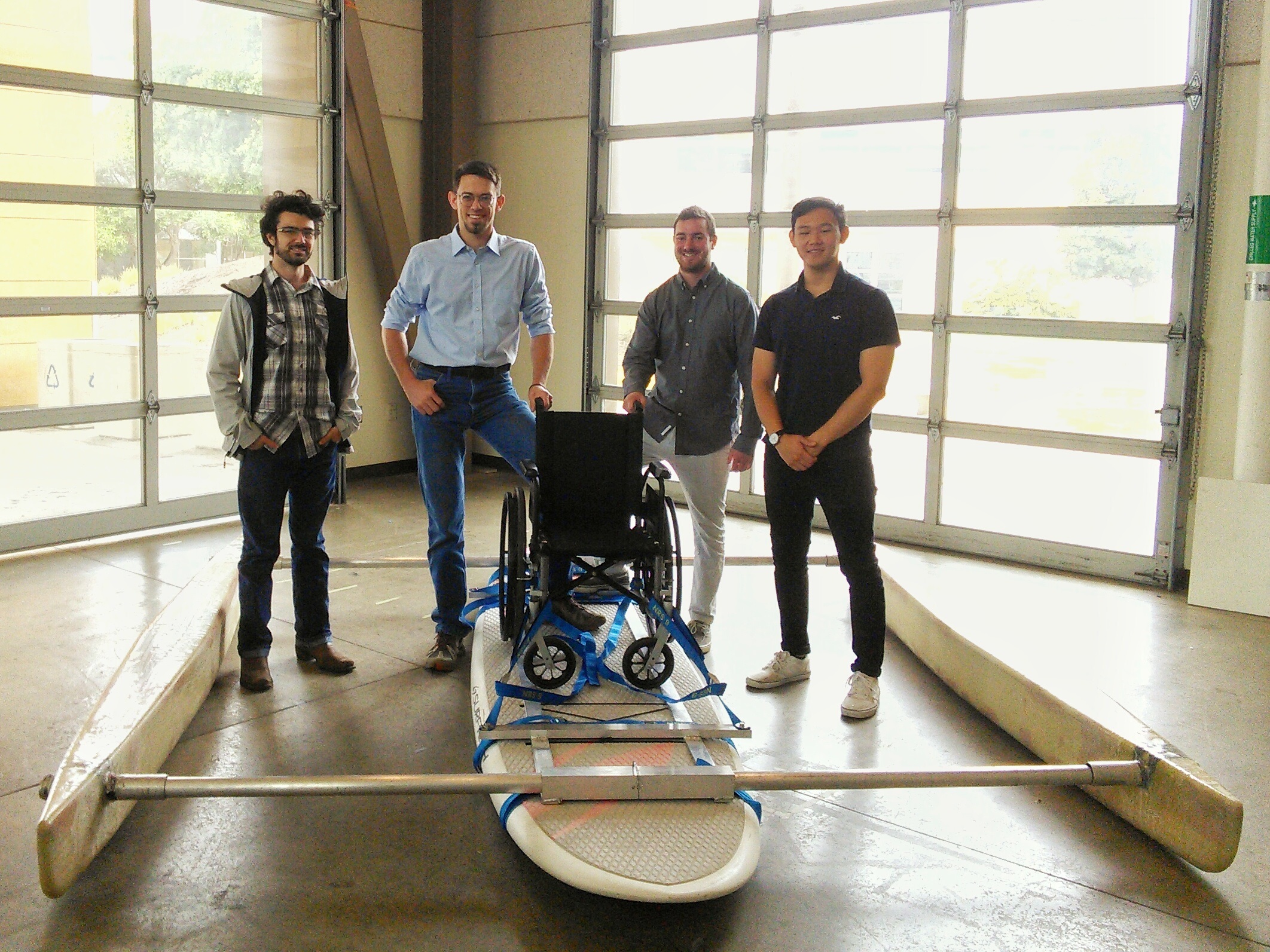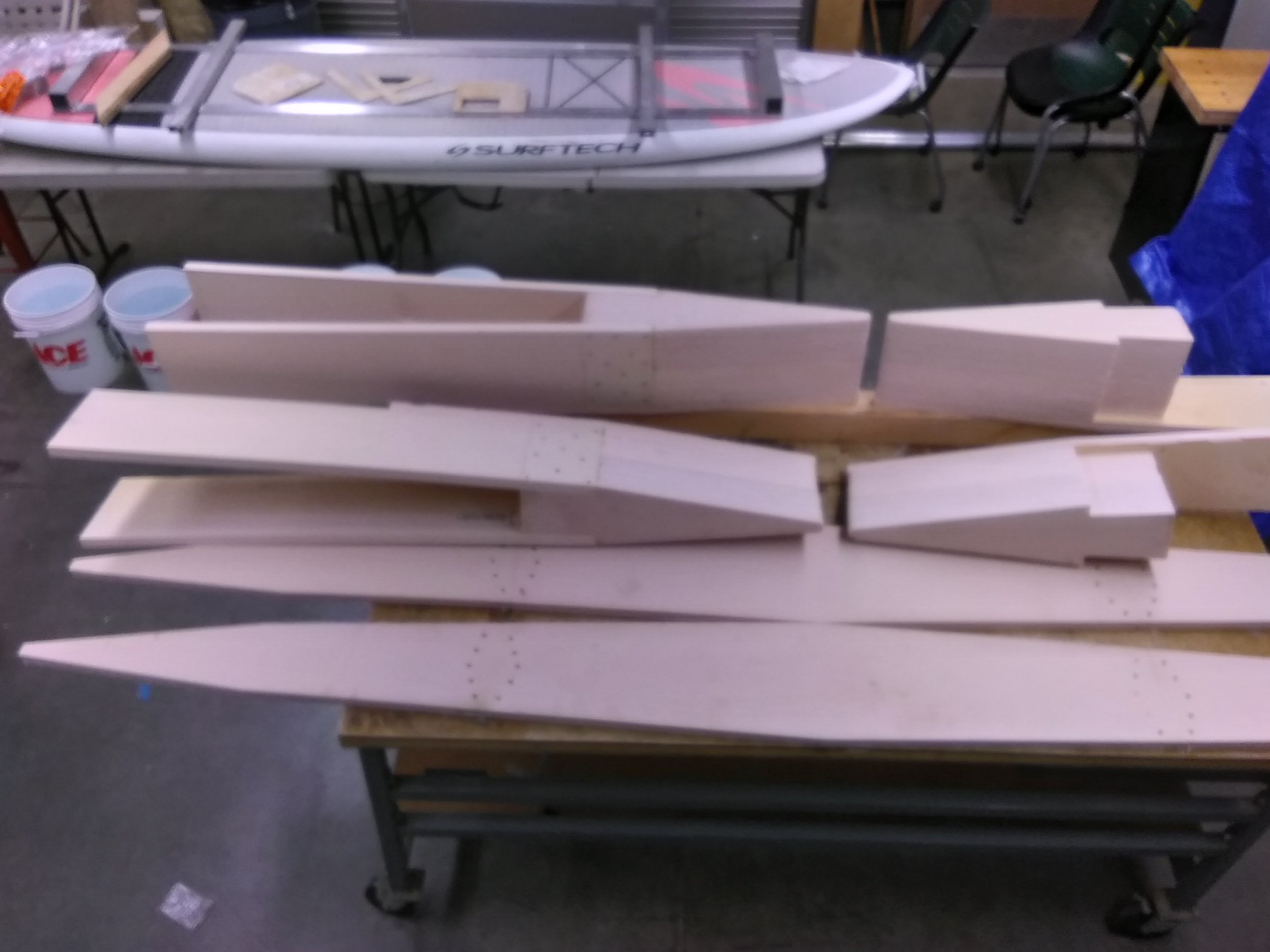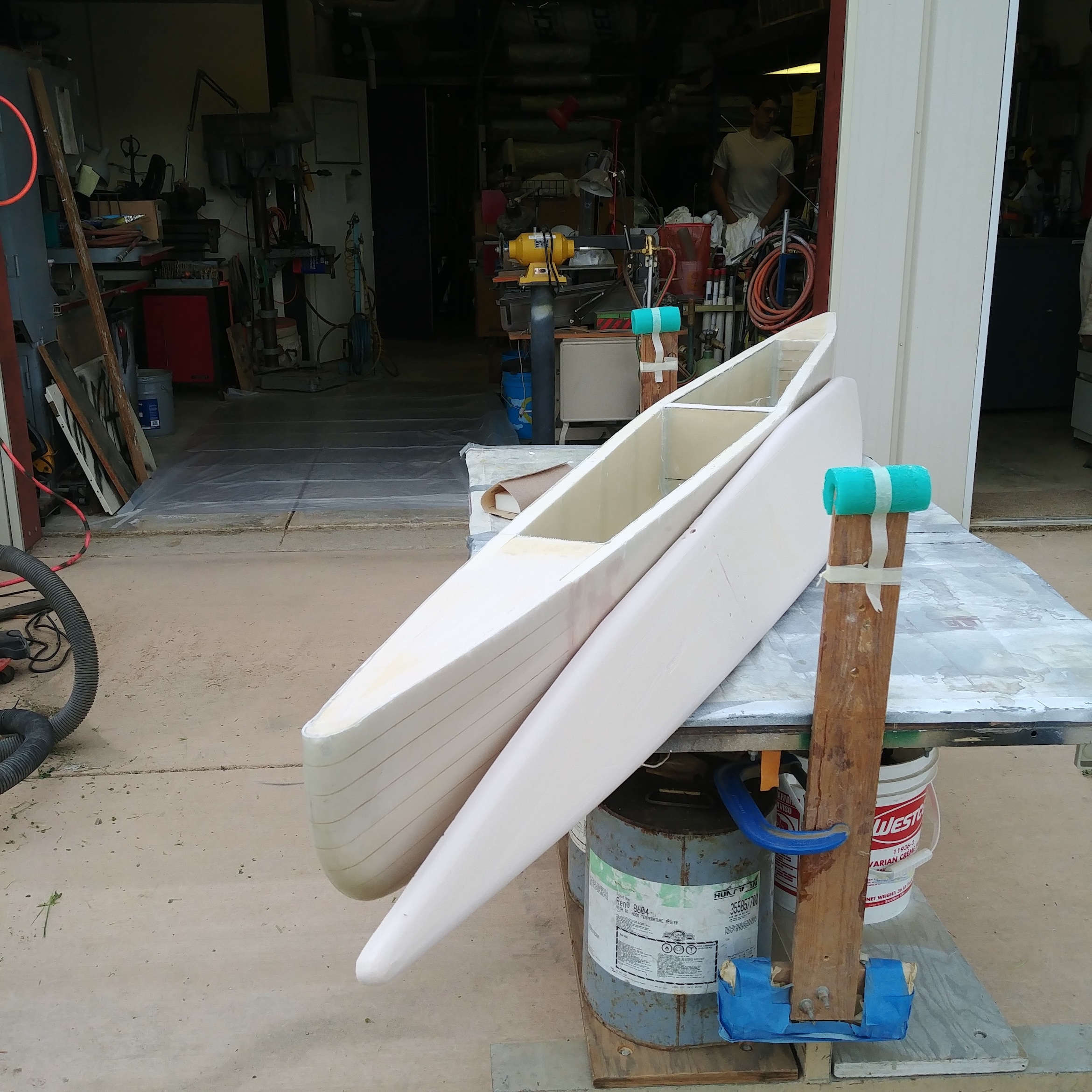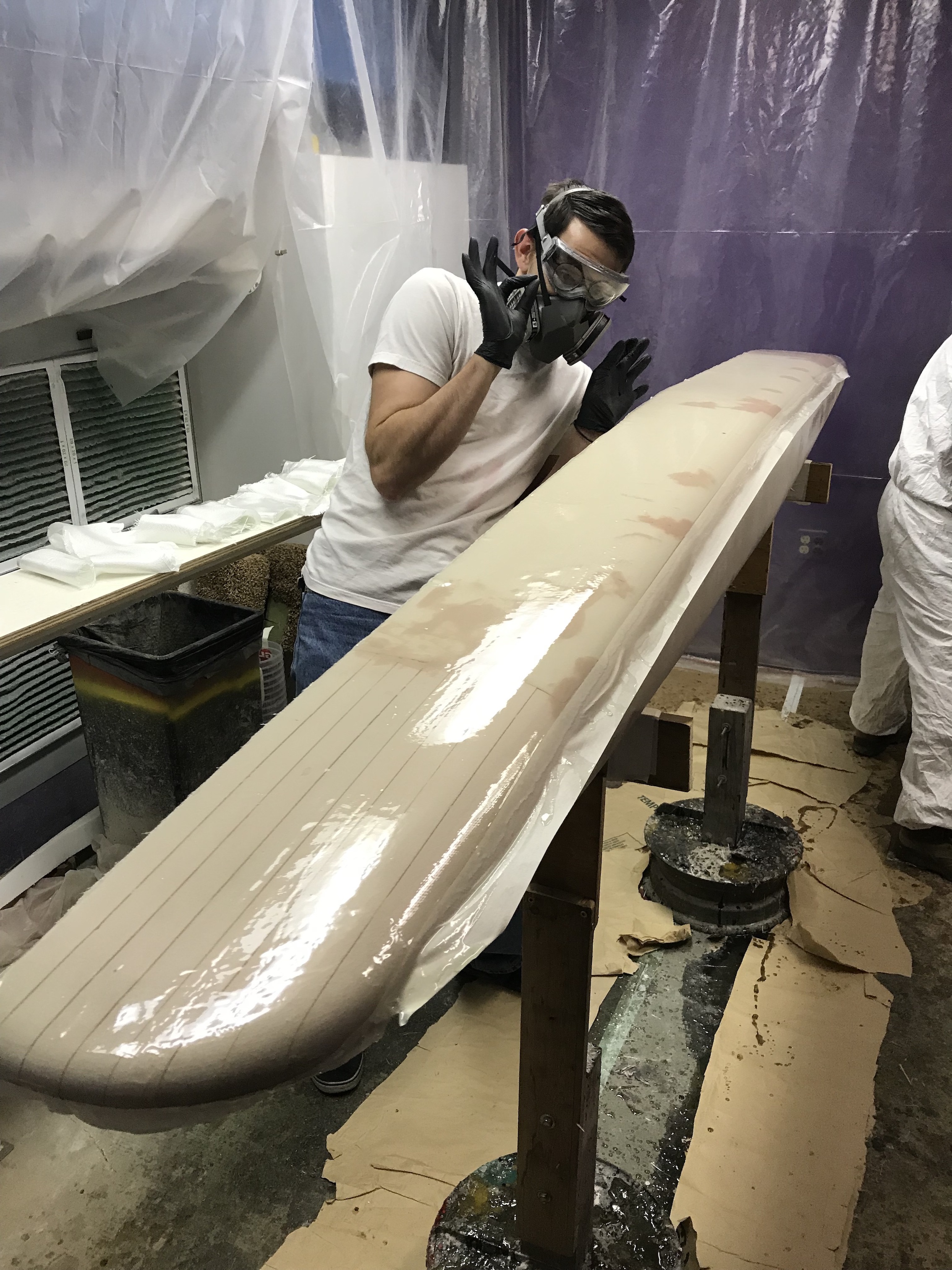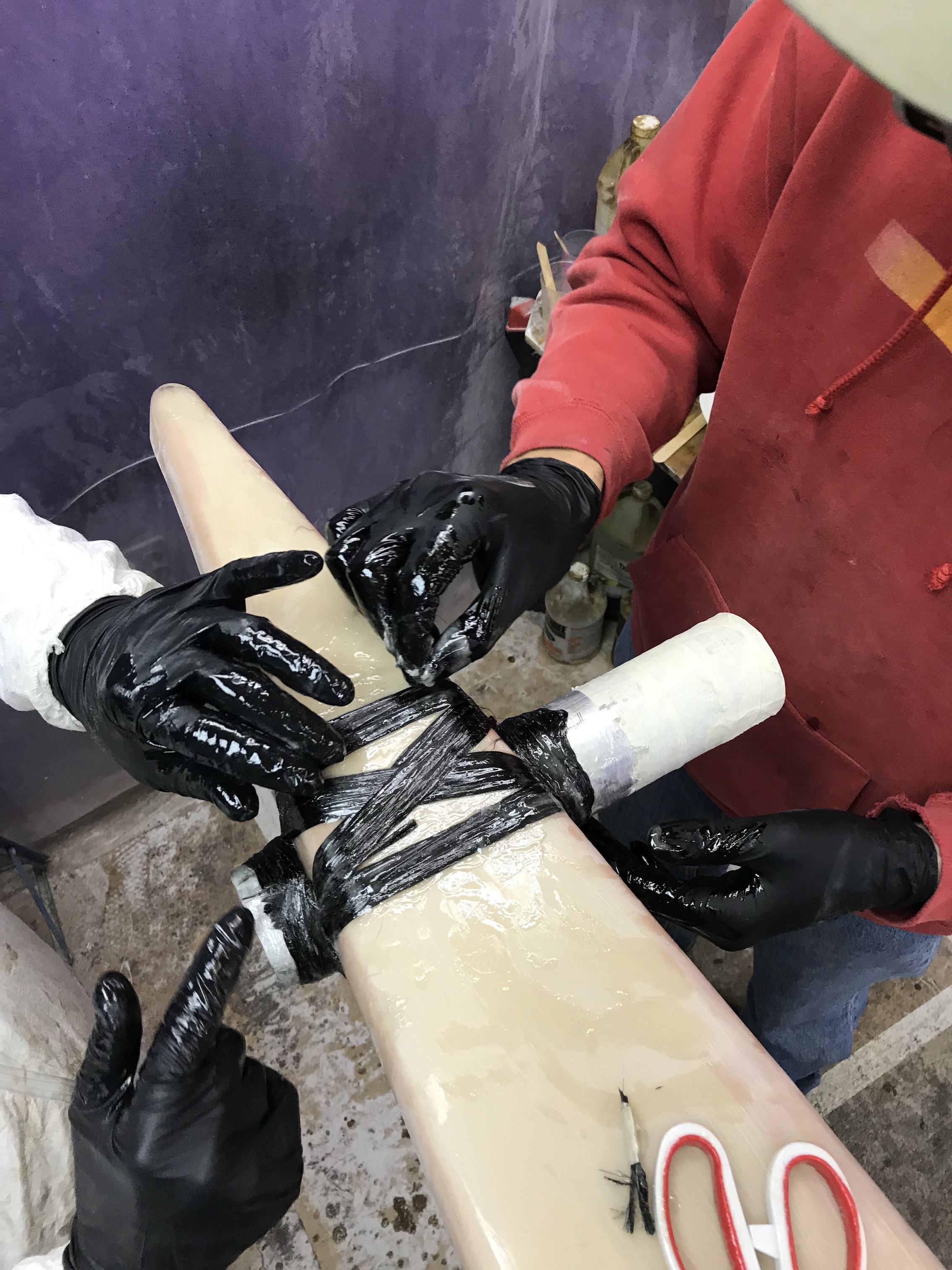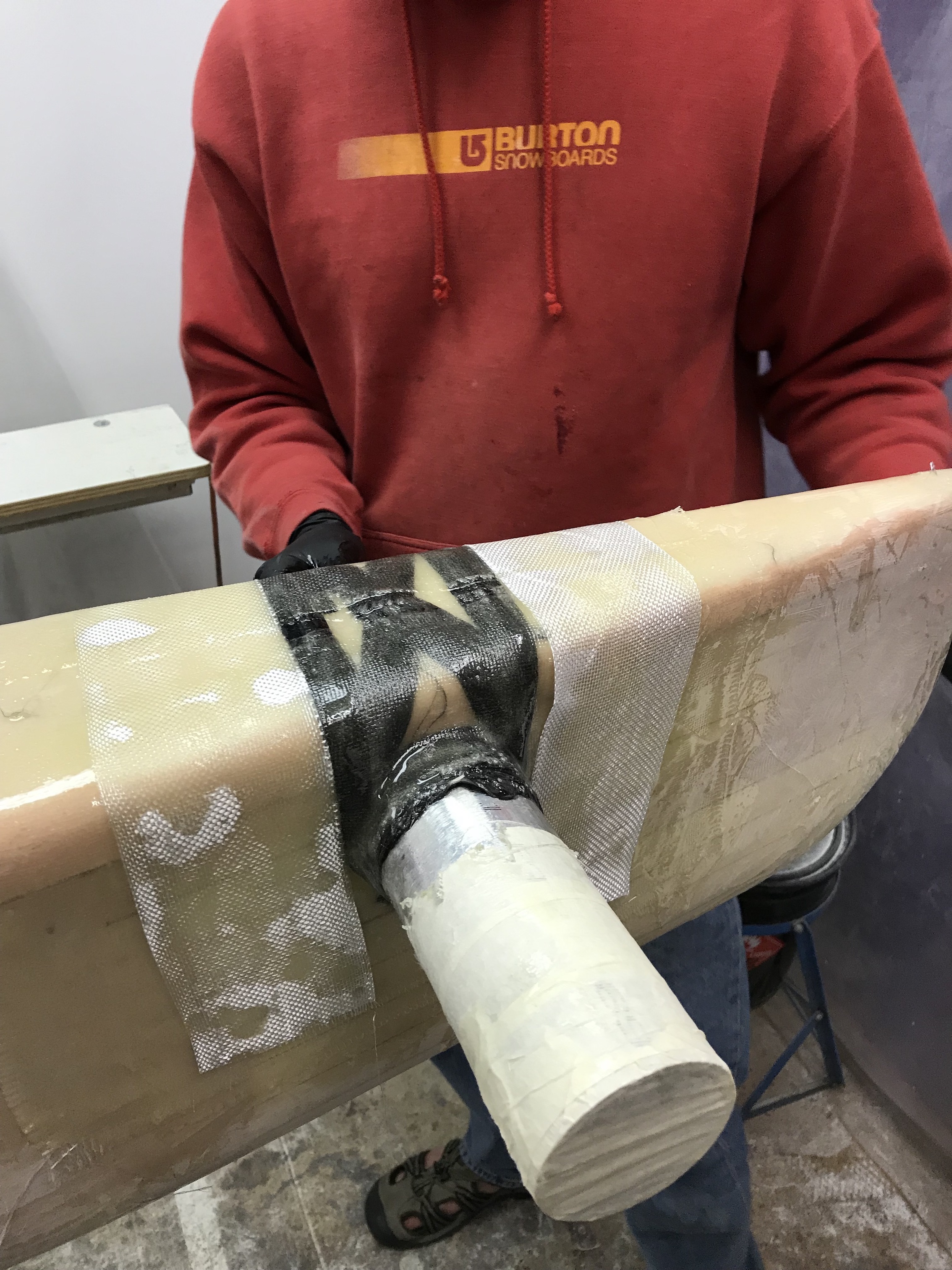Cal Poly San Luis Obispo requires a Senior Capstone Project that is the culmination of a student’s undergrad education. Each year groups of 3 to 4 students pick a “real world” project sponsored by industry or the community and devote three quarters to the design, build and testing of their project. One such group took on a “Paddle Board for all Persons” project for the Central California Adaptive Sports Center (CCASC) based at Shaver Lake, California with Professor Sarah Harding as their Advisor.
For their project the four mechanical engineering students, Alexander Holthaus, Garrett Holmes, Garett Jones and Sean Yuch, not only built a highly adaptable outrigger pontoon system for a standard paddleboard, they also created a collapsible ramp that can be used from a beach or dock. Volunteer Composites Consultant George Leone fills us in on this senior student project, designed using Precision Board urethane tooling foam from Coastal Enterprises.
In George’s own words…
Stand-up Paddleboarding (SUP) is a popular watersport activity, but current SUP technology is limited for persons with various disabilities. While there are currently adaptive paddleboards on the market, they are often limited to only certain types of disabilities, feature parts that are fixed onto the board, and are priced beyond what most adaptive sports nonprofits can afford.
The student’s challenge was to design a system that could attach to any commercial stand-up paddleboard and make it extremely stable so that people with a variety of disabilities could safely use it. The system also needed to be assembled with a minimum of tools, disassembled quickly, and be easily portable. Finally, it needed to be made of commonly available materials since the design needed to be “open source” to allow more wheelchair users to enjoy stand-up paddleboarding.
A primary design focus of the project is to make it usable by a large number of people with different disabilities and levels of mobility. Another factor was that the system had to support a person or persons with a combined weight of over 350 pounds since an instructor often needed to be onboard with the participant. Further, the harness system needed to accommodate a wide variety of wheel chairs so that participants could use their own chair.
The result was an adaptive SUP system that can be adjusted and modified for each user. Instead of drilling holes into the board and bolting a chair (limiting its usage and buoyancy), the students created a Velcro strap system that can connect any wheelchair to an aluminum support frame attached to a standard commercial SUP. They also created two adjustable outrigger pontoons that connect to the SUP for stability and buoyancy. Finally, the students also created a collapsible ramp so a wheelchair user can roll onto the SUP in their own wheelchair and be secured down with the help of another person.
Coastal Enterprises’ Precision Board High Density Urethane PBLT-6 density foam was chosen for its consistent density and flexibility for both hand and machine shaping. The added benefit of the foam’s versatility with all resin systems during the manufacturing process was also a plus. Finally, the availability of educational on-line videos covering everything from basic shaping to gluing pieces together was definitely important to the team!
The foam needed to be light and strong not only as a final product, but also because it had to be moved many times during the build process. Its high ‘Rapidly Renewable Resource’ content of 23.9{afbea94bd31582343c3017644f03ec8d7d8fa2386ecb82c250661e06c0c6e111} was also a factor in the Team’s decision to use Precision Board foam, and it resonated well with project sponsor Randy Coffman, Executive Director of CCASC.
After the design phase was complete, the students moved to the construction phase. Since they knew nothing about fiberglassing, they enlisted my help (Ed note: George Leone is the recently retired Student Projects Lab Supervisor and long-time surfboard maker). I welcomed the students and talked them through the foam shaping and fiberglassing elements of their project.
The components of the paddleboard were built in two of the shops in the Engineering College. The Mustang’ 60 shop in the Bonderson Projects Center and the Hangar Student Projects shop. A real airplane hangar. There used to be an airport on campus and a hangar big enough for a DC-3 (15,000 sq. ft.) was built in 1947.
The Team used an older ShopBot CNC router to shape the foam sheets to fit together internally, while leaving a “rough shape” on the exterior to save machine time. Since time on the university’s ShopBot is in high demand, the Team opted to do the final shaping by hand.
After they bonded the layers of foam into a single piece for each pontoon, they left the top open so they could glass the hollowed out interior using polyester resin, thus saving weight and strengthening the pontoons. Once they bonded the top foam “cap” on each pontoon, the exterior was hand-shaped to the final contours, using “cereal-box edge” templates and bending long strips of metal to blend the larger curves. Finally, the exterior was glassed with polyester resin.
In the testing phase they measured the buoyancy to find the height where the outrigger pontoons sat in the water. They marked the height and punched holes through the pontoons above that line, inserted .25″ (6mm) wall 2.5″ (65mm) aluminum tubing, then bonded the tubing to the pontoon with micro-balloons and epoxy, wrapped carbon tow around the tubing and over the top of the pontoons to reinforce the general area.
These pontoons slide on a pair of 10 ft. (3m) 2″ (50 mm) diameter aluminum tubes that bisect the SUP through the aluminum support frame. This allows the pontoons to be moved to a wider or narrower stance depending on the weight and skill level of the user.
On June 8, 2019, the Adaptive Paddleboard was tested in Morro Bay, CA and passed with flying colors. Ten days later, on June 18, 2019, a 26 year-old woman who has spastic quadriplegia (a severe from of cerebral palsy) set out on Shaver Lake to experience a watersport that she never dreamed possible. Here’s some photos from the CCASC Facebook Page of that day.
George Leone ran the Cal Poly Projects Shop from 2001 to 2017. This shop includes facilities for machining, student welding, woodworking, sheet metal work, advanced composites and design space for senior projects, as well as nine engineering clubs that compete at a national level. After retiring in July of 2017, he signed up as a volunteer again working with student teams and Senior Projects at least 1 day a week.
The College of Engineering at Cal Poly San Luis Obispo is an internationally-recognized, premier undergraduate engineering college. Its mission is to provide an excellent Learn by Doing education and to graduate in-demand, Day One-ready professionals. The College vision is to transform students into world class, innovative and collaborative engineers to meet the challenges of the 21st century.
State-of-the-art facilities and laboratories form the core of Engineering’s project-centered curriculum. Ranging from the Aircraft Design Lab to the Rotor Dynamics Laboratory, these facilities offer advanced technological systems that allow students to link theory with practice. College buildings also promote interdisciplinary project activities, including the Advanced Technology Laboratories, Bonderson Projects Center, and Engineering IV. With 19,000 square feet of space for individual and team-based projects, the Bonderson Center offers enriched opportunities for multidisciplinary projects and collaboration with industry. Engineering IV, a 104,000-square-foot building includes modern classrooms and laboratories for aerospace, mechanical, civil, environmental, industrial and manufacturing engineering programs.
At Coastal Enterprises, we like to look at the composites industry as a fully collaborative effort. Every fresh new development by an individual is really a contribution to a collective knowledge base. Like any scientific pursuit, the most potent advancements are made when information is shared freely between likeminded groups of people. For this reason, we feel obliged to do everything we can to enlighten and empower the future community of composites professionals. That’s why we support school programs with donations of Precision Board HDU. Click HERE to find out more about the program or give us a call with your questions at 800-845-0745.
